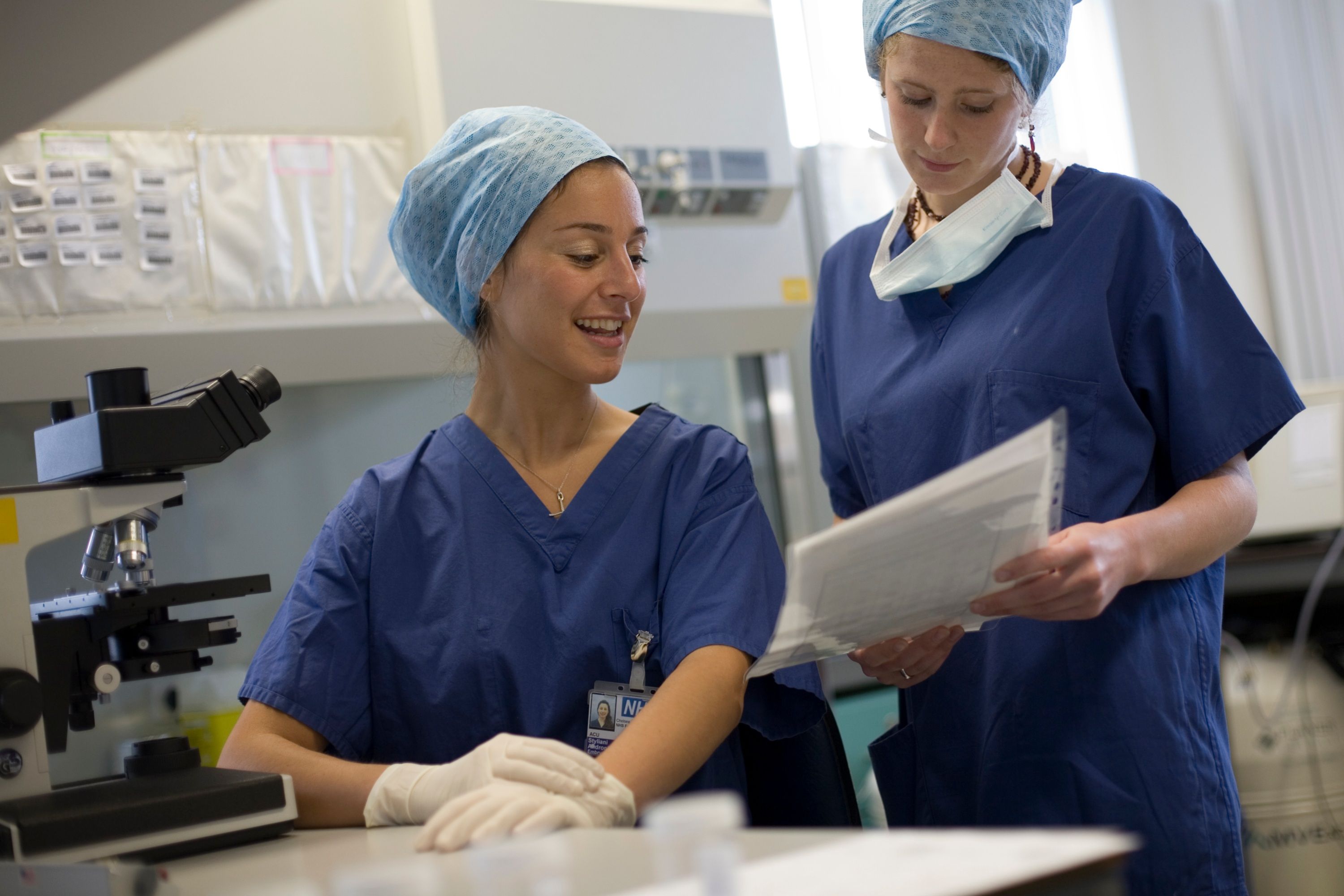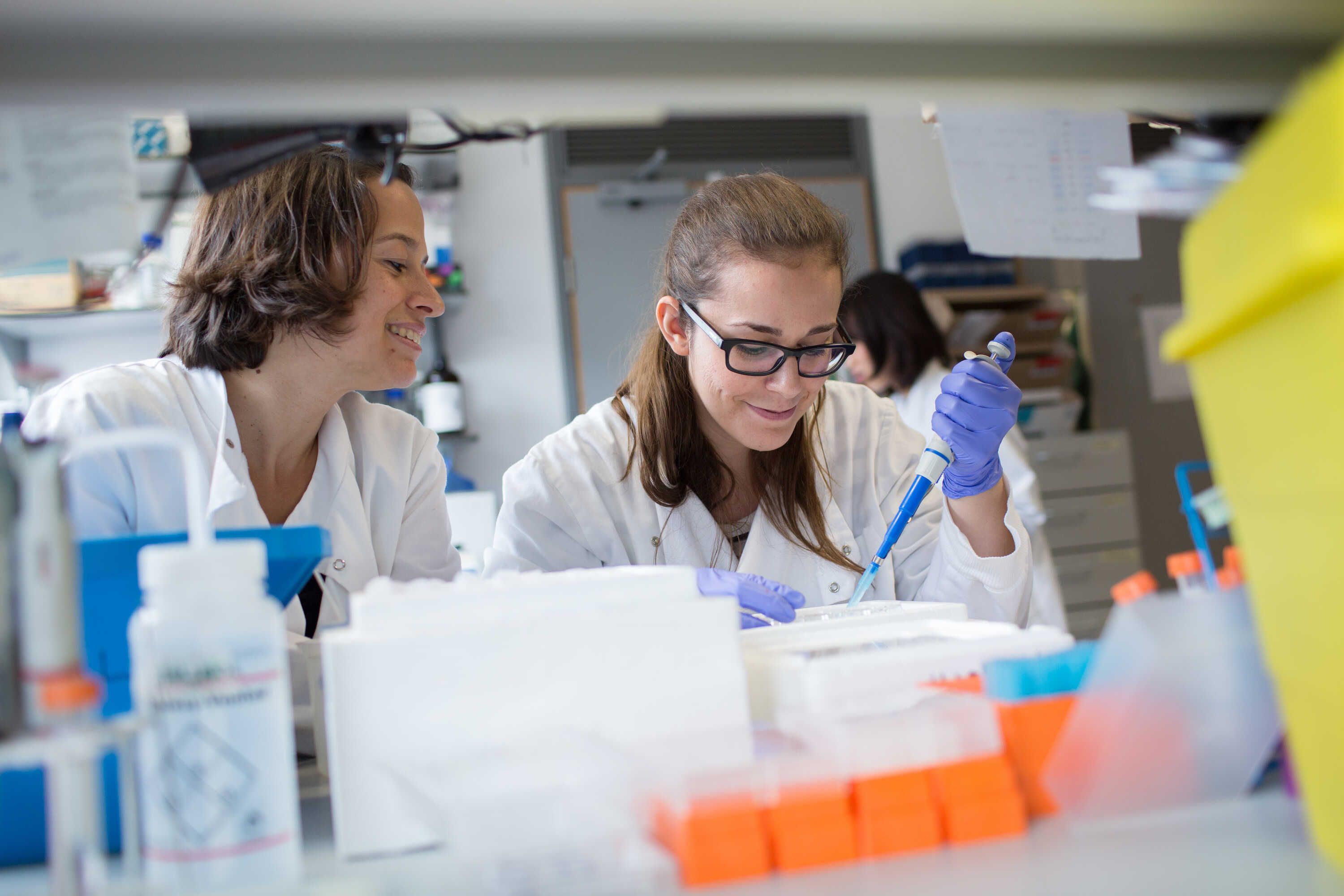
Reproductive and Developmental Biology
Develop your skills for a scientific or clinical career in reproductive and developmental biology.
Reproductive and Developmental Biology
Develop your skills for a scientific or clinical career in reproductive and developmental biology.
Build a detailed understanding of reproductive and developmental biology while developing research and transferable skills to support your future career
Advance your understanding of the molecular and cellular aspects of reproduction and development
Build your confidence as an independent researcher through a range of self-directed learning approaches
Course key facts
-
Qualification
-
MSc
-
-
Duration
1 year
-
Start date
September 2024
-
Study mode
Full-time
-
Fees
£14,900 Home
£43,250 Overseas
-
Delivered by
-
Location
-
Hammersmith
-
Minimum entry standard
-
2:1 in biological science, medicine or veterinary science
-
Qualification
-
PG Cert
-
-
Duration
4 months
-
Start date
September 2024
-
Study mode
Full-time
-
Fees
£7,450 Home
£21,625 Overseas
-
Delivered by
-
Location
-
Hammersmith
-
Minimum entry standard
-
2:1 in biological science, medicine or veterinary science
Course overview
Gain detailed theoretical knowledge of reproductive and developmental biology on this Master's course.
Through a series of taught modules, you'll develop academic, practical and transferable skills towards a career in scientific research or assisted reproduction.
The study programme focuses on the basic sciences and their application to selected clinical aspects of the subject.
You'll build an in-depth knowledge of molecular and cellular aspects of reproduction and development. Teaching is carried out within a vibrant research environment on our Hammersmith campus.
You'll also critically evaluate the limits of current knowledge in this field of biology, and propose alternative explanations for controversies in the field.
The MSc course also provides an opportunity to undertake a project based within a research group.
This work is designed to enhance your practical laboratory skills and enables you to specialise in a research area of interest.
Gain detailed theoretical knowledge of reproductive and developmental biology on this course, which leads to the award of a Postgraduate Certificate (PG Cert).
Through a series of taught modules, you'll develop academic, practical and transferable skills towards a career in scientific research or assisted reproduction.
The study programme focuses on the basic sciences and their application to selected clinical aspects of the subject. Teaching is carried out within a vibrant research environment on our Hammersmith campus.
You'll build an in-depth knowledge of molecular and cellular aspects of reproduction and development within a vibrant research environment on our Hammersmith campus.
You'll also critically evaluate the limits of current knowledge in this field of biology, and propose alternative explanations for controversies in the field.
Structure
This page is updated regularly to reflect the latest version of the curriculum. However, this information is subject to change.
Find out more about potential course changes.
Please note: it may not always be possible to take specific combinations of modules due to timetabling conflicts. For confirmation, please check with the relevant department.
You’ll study all the following modules.
Core modules
Explore the origins, development and function of the germ cells and the gonads, focusing on how local and systemic signalling pathways regulate developmental processes from foetal life through to adulthood.
Develop your understanding of the cellular and molecular events that occur during fertilisation, and subsequent preimplantation embryo development.
You'll also examine the development of IVF and therapeutic assisted reproductive technologies, and the impact of the in vivo and in vitro environment of maturing gametes and preimplantation embryos.
Assess the main events of human pregnancy, from the perspectives of the developing embryo and foetus, the placenta and the mother.
You'll join an active research team to conduct an independent research project in an area of your interest.
Projects usually cover a variety of topics across the breadth of reproductive and developmental biology.
These have previously included gonadal development and function, stem cell biology, embryonic and placental development, and reproductive medicine.
Working full-time on the project, you’ll be supervised and supported by members of the group and encouraged to join in all the activities of the research group, including lab meetings and seminars.
Your work will be assessed by a poster, dissertation and viva.
You’ll study the following core module.
Core modules
Explore the origins, development and function of the germ cells and the gonads, focusing on how local and systemic signalling pathways regulate developmental processes from foetal life through to adulthood.
You’ll study one of two optional modules.
Optional modules
Develop your understanding of the cellular and molecular events that occur during fertilisation, and subsequent preimplantation embryo development.
You'll also examine the development of IVF and therapeutic assisted reproductive technologies, and the impact of the in vivo and in vitro environment of maturing gametes and preimplantation embryos.
Assess the main events of human pregnancy, from the perspectives of the developing embryo and foetus, the placenta and the mother.
Teaching and assessment
Balance of teaching and learning
Key
- Lectures, tutorials, practicals and independent study
- Research project and dissertation
- 50% Lectures, tutorials, practicals and independent study
- 50% Research project and dissertation
Teaching and learning methods
-
Group discussions
-
Lectures
-
Practical workshops
-
Seminars
Assessment methods
-
Critical appraisals
-
Report writing / writing for a lay audience
-
Oral presentations
-
Poster presentations
-
Data handling and analysis
-
Experimental design and project planning
Balance of teaching and learning
Key
- Lectures, tutorials, practicals and independent study
- Research project and dissertation
- 100% Lectures, tutorials, practicals and independent study
- 0% Research project and dissertation
Teaching and learning methods
-
Group discussions
-
Lectures
-
Practical workshops
-
Seminars
Assessment methods
-
Critical appraisals
-
Report writing / writing for a lay audience
-
Oral presentations
-
Poster presentations
-
Data handling and analysis
-
Experimental design and project planning
Entry requirements
We consider all applicants on an individual basis, welcoming students from all over the world.
How to apply
Apply online
You can submit one application form per year of entry. You can choose up to two courses.
This course is divided into two progressional levels of study:
- PG Certificate (PG Cert)
- MSc
Each level of study has its own entry point; you can apply to either level in the first instance, but we recommend you apply for the award with which you wish to exit.
Read more about Postgraduate Certificate, Diploma and MSc degrees
There is no application fee for MRes courses, Postgraduate Certificates, Postgraduate Diplomas, or courses such as PhDs and EngDs.
If you are applying for a taught Master’s course, you will need to pay an application fee before submitting your application.
The fee applies per application and not per course.
- £80 for all taught Master's applications, excluding those to the Imperial College Business School.
- £100 for all MSc applications to the Imperial College Business School.
- £150 for all MBA applications to the Imperial College Business School.
If you are facing financial hardship and are unable to pay the application fee, we encourage you to apply for our application fee waiver.
Find out more about how to apply for a Master's course, including references and personal statements.
An ATAS certificate is not required for students applying for this course.
Tuition fees
Home fee
MSc
£14,900
PG Cert
£7,450
You should expect and budget for your fees to increase each year.
Your fee is based on the year you enter the College, not your year of study. This means that if you repeat a year or resume your studies after an interruption, your fees will only increase by the amount linked to inflation.
Find out more about our tuition fees payment terms, including how inflationary increases are applied to your tuition fees in subsequent years of study.
Whether you pay the Home or Overseas fee depends on your fee status. This is assessed based on UK Government legislation and includes things like where you live and your nationality or residency status. Find out how we assess your fee status.
If you're a UK national, or EU national with settled or pre-settled status under the EU Settlement Scheme, you may be able to apply for a Postgraduate Master’s Loan from the UK government, if you meet certain criteria.
The government has not yet published the loan amount for students starting courses in Autumn 2024. As a guide, the maximum value of the loan was £12,167 for courses starting on or after 1 August 2023.
The loan is not means-tested and you can choose whether to put it towards your tuition fees or living costs.
Overseas fee
MSc
£43,250
PG Cert
£21,625
You should expect and budget for your fees to increase each year.
Your fee is based on the year you enter the College, not your year of study. This means that if you repeat a year or resume your studies after an interruption, your fees will only increase by the amount linked to inflation.
Find out more about our tuition fees payment terms, including how inflationary increases are applied to your tuition fees in subsequent years of study.
Whether you pay the Home or Overseas fee depends on your fee status. This is assessed based on UK Government legislation and includes things like where you live and your nationality or residency status. Find out how we assess your fee status.
If you're a UK national, or EU national with settled or pre-settled status under the EU Settlement Scheme, you may be able to apply for a Postgraduate Master’s Loan from the UK government, if you meet certain criteria.
The government has not yet published the loan amount for students starting courses in Autumn 2024. As a guide, the maximum value of the loan was £12,167 for courses starting on or after 1 August 2023.
The loan is not means-tested and you can choose whether to put it towards your tuition fees or living costs.
Scholarships
The Dean’s Master’s Scholarships
Value per award
- £10,000
Who it's for
- All students applying to study a Faculty of Medicine Master’s programme beginning in October 2024
The Dr Jean Alero Thomas Scholarships
Value per award
- Partial or full tuition fee at the Home rate
Who it's for
- All students applying to study a Faculty of Medicine lab-based Master’s programme beginning in October 2024
The Dean’s Master’s Scholarships
Value per award
- £10,000
Who it's for
- All students applying to study a Faculty of Medicine Master’s programme beginning in October 2024
The Dr Jean Alero Thomas Scholarships
Value per award
- Partial or full tuition fee at the Home rate
Who it's for
- All students applying to study a Faculty of Medicine lab-based Master’s programme beginning in October 2024
How will studying at Imperial help my career?
Gain transferable skills relevant to further studies in reproductive and developmental biology or a career in medicine.
Our graduates often pursue further study in master's programs or doctoral research.
You could consider career opportunities in assisted reproduction (IVF) or clinical specialisation.
Previous graduates have also moved into teaching, or entered careers that require critical and numerical skills.
Further links
Contact the department
Course Directors: Professor Kate Hardy and Dr Andy Childs
Course Organiser: Dr Mark Sullivan
Visit the Department of Metabolism, Digestion and Reproduction website.

Register your interest
Stay up to date on news, events, scholarship opportunities and information related to this course.
Register your interest


Terms and conditions
There are some important pieces of information you should be aware of when applying to Imperial. These include key information about your tuition fees, funding, visas, accommodation and more.
You can find further information about your course, including degree classifications, regulations, progression and awards in the programme specification for your course.
Programme specifications

